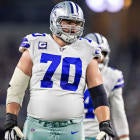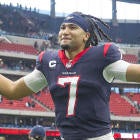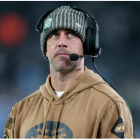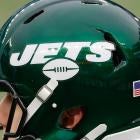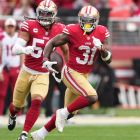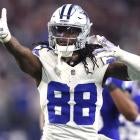A 53-man roster under the salary cap using actual cap numbers with certain parameters, which are below, was assembled at the start of the season. The composition of the roster has changed dramatically in this end-of-the-season version because a primary emphasis was put on 2018 performance.
Aaron Rodgers is no longer the choice at quarterback. Quite frankly, other quarterbacks have had better seasons. Rodgers isn't in the MVP discussion, which he usually is when playing a full slate of games. An incorrect assumption was made that David Johnson would regain his 2016 form in which he was the NFL's best dual-threat running back. A foot injury sidelined Chargers defensive end Joey Bosa, the 2016 NFL Defensive Rookie of the Year, until the middle of November.
(Stream all Sunday's games on fuboTV, try it for free, and stream the CBS games on CBS All Access.)
Parameters
1. The salary cap for the roster is $188.71 million. The actual NFL salary cap is $177.2 million for this year. The number being used is the league's average adjusted salary cap according to NFLPA data. Each NFL team's working salary cap varies largely because unused cap room can be carried over from one year to the next. For example, the Browns have league's highest adjusted salary cap at slightly over $241.263 million and the Ravens have the lowest at just under $176.486 million. This is because of incentives earned during the 2017 season that weren't counting on Baltimore's cap being accounted for without having cap room to carry over from last year to cover the difference.
2. The NFL draft is an essential element of roster building for NFL teams, so it is here also. One player from each round of 2018 draft must be on the roster. The number requirement drops by one player for each year of the preceding three drafts (2015-2017). The limit of one player per round remains. Thus, only four 2015 draft picks are required. There's one other draft pick constraint. Only one 2014 first-round pick playing on a fifth-year option is allowed. There isn't a limit on 2014 first rounders who have signed contract extensions.
3. The backups at each position are limited to players that aren't clear-cut established starters. This means players at positions where there's a "by-committee" approach, usually running back, qualify. A backfield containing Todd Gurley and Ezekiel Elliott is prohibited, since both are workhorse or every-down running backs. Those starting only because of an injury are also fair game as reserves. Young veterans, particularly second-year players, solidifying a place in the lineup for the first time this season are no longer allowed to be backups. Players such as Seahawks running back Chris Carson can't be depth. Rookies can be either starters or backups, regardless of actual playing time.
4. There's one big allowance being made defensively. Three starting cornerbacks are acceptable without sacrificing a starter in a traditional base defense, since five or more defensive backs are now used over 60 percent of the time in the NFL. The result is twelve defensive starters.
5. Choosing a player that was given a franchise or transition designation in 2018 is optional. However, only one player receiving a 2018 designation can be selected.
Here's the revamped team I assembled with some of my thoughts behind the selections. The 2018 salary-cap number for each player is in parentheses. In cases where a player was elevated from the practice squad or signed off the street during the season, what would have been his full-year cap number is being used.
Starters: Offense
QB: Patrick Mahomes, Chiefs ($3,739,838)
A potential franchise quarterback on a rookie contract is the most valuable commodity in the NFL. The roster flexibility Mahomes' cap number provides couldn't be ignored. Mahomes is having the best season for a second-year quarterback since Dan Marino in 1984. Mahomes, the league MVP frontrunner, is on pace to join Peyton Manning as the only other quarterbacks to throw for at least 50 touchdowns and 5,000 yards in the same season.
RB: Ezekiel Elliott, Cowboys ($6,812,724)
Elliott is on the verge of winning his second rushing title during his three NFL seasons. His 1,434 yards on the ground are 183 more than Todd Gurley, who has the second most in the league and is battling a minor knee injury. Elliott has become more a threat in the Dallas passing game with 77 receptions. He also leads the NFL with 2,001 yards from scrimmage (combined rushing and receiving yards).
WR: DeAndre Hopkins, Texans ($14,006,665)
Hopkins is as sure-handed as they come. He hasn't dropped a pass all season according to Stats, Inc. Hopkins has caught 103 balls for 1,425 yards with 11 touchdowns this season.
WR: Julio Jones, Falcons ($12,866,666)
Nobody has more receiving yards than Jones' 4,392 since the start of the 2016 season. He is leading the NFL with 1,539 yards on 104 receptions. Jones also topped the league in receiving yards in 2015, when he had a career-best 1,871. This is the third time Jones has cracked the 1,500 receiving mark in his eight NFL seasons. He is currently the all-time leader in reception yards per game with 96.3 each outing.
WR: Tyreek Hill, Chiefs ($704,996)
Hill is having the finest season in Chiefs history for a wide receiver. He has 82 catches, 1,378 receiving yards and 11 touchdown receptions. All three marks are career highs. Hill needs 14 more yards to break the Chiefs franchise record Derrick Alexander set in 2000. He is a dangerous deep threat but will spend significant time operating out of the slot: 44.2 percent of Hill's snaps have come from there, according to Pro Football Focus (PFF). He also leads the NFL with 26 receptions over 20 yards. Hill is also an excellent kick and punt returner but probably won't get much of an opportunity to showcase those skills, which led to him earning first-team All-Pro honors as a rookie in 2016, because of his importance in the passing game.
TE: Zach Ertz, Eagles ($4,994,380)
A case can be made that Ertz has established himself as the NFL's best tight end during the past two seasons. He has set a single-season receptions record for tight ends in 2018 with 113 grabs.
LT: David Bakhtiari, Packers ($11,168,750)
Keeping Rodgers upright in the pocket is of the utmost importance. That's where Bakhtiari, who earned All-Pro honors in 2016 and 2017, comes in handy. He is the league's best blindside protector.
LG: Shaq Mason, Patriots ($3,424,976)
The Patriots were wise to sign Mason to a five-year, $45 million extension (worth a maximum of $50 million) in the preseason instead of letting the 2015 fourth-round pick play out his rookie contract. Mason makes the shift from his customary right guard spot to the position he manned as a rookie.
C: Jason Kelce, Eagles ($7,206,665)
The 2017 first-team All-Pro hasn't given up a sack this season. The six-year extension averaging just under $6.3 million per year Kelce signed in 2014 makes him a bargain. The top of the center market is currently in the $10 million-per-year range.
RG: Zack Martin, Cowboys ($6,006,665)
Martin is widely regarded as the best offensive guard in football. He hasn't done anything to dispel the notion this season despite being bothered by a left knee sprain for much of the season.
RT: Mitchell Schwartz, Chiefs ($7.7 Million)
The wrong Chiefs tackle was selected to the Pro Bowl. Schwartz was more deserving of the honor than left tackle Eric Fisher.
Starters: Defense
DE: J.J Watt, Texans ($14,196,880)
Watt was facing a crossroads when training camp opened because injuries limited him eight games over the prior two seasons. The three-time NFL Defensive Player of the Year responded with flying colors. He is tied for third in the league with 14.5 sacks and became a leading candidate for NFL Comeback Player of the Year. Watt will line up everywhere on the defensive line. He'll take his fair share of snaps inside rushing the passer on obvious passing downs.
DT: Aaron Donald, Rams ($8.892 Million)
The reigning NFL Defensive Player of the Year is hands down the league's most disruptive force from the interior of a defensive line. Donald has set a record for a defensive tackle with 19.5 sacks. He has an outside shot at breaking Michael Strahan's single-season sack record of 22.5 sacks heading into the season finale. It's a foregone conclusion that Donald will win his second-consecutive Defensive Player of the Year award.
DT: Chris Jones, Chiefs ($1,669,429)
Jones has gotten the NFL's attention with his pass rushing prowess. His 15.5 sacks lead the AFC. Nobody in NFL history had ever recorded a sack in 11-straight games until Jones' current streak this season.
DE: Danielle Hunter, Vikings ($5,070,471)
Hunter sold himself short by signing a five-year, $72 million extension with $40.007 million of guarantees during the offseason. He would have been facing a 2019 franchise tag in the $17.3 million range by merely duplicating his 2017 performance, which he has easily exceeded. Hunter is tied for third in the NFL with 14.5 sacks. Since Hunter is having a career year while playing out his contract, he would have been in a position to potentially leverage the franchise tag into a long-term deal averaging in the $20 million-per-year neighborhood.
SLB: Khalil Mack, Bears ($13.8 Million)
Mack returns to the strong side spot, where he spent time during the first two years of his NFL career in base defense while playing for the Raiders. The 2016 NFL Defensive Player of Year made an immediate impact after the Bears gave up their next two first-round picks to get him from the Raiders on Labor Day weekend with a blockbuster contract in the process. Mack became the league's highest-paid non-quarterback at $23.5 million per year. His dominance has set the tone for the Bears capturing the NFC North. Mack, who has 12.5 sacks, will become an edge rusher in passing situations to capitalize on his ability to get to the quarterback.
MLB: Bobby Wagner, Seahawks ($13,606,880)
The tackling machine is arguably having his best season in a career resume that Seahawks head coach Pete Carroll calls Hall of Fame worthy. Wagner was selected to his fifth-straight Pro Bowl after becoming the first player in Seahawks history to have seven-consecutive 100-tackle seasons. Wagner's 830 tackles are the most in the NFL since 2013.
WLB: Darius Leonard, Colts ($1,317,397)
Leonard is staking his claim to the NFL Defensive Rookie of the Year award. The second-round pick has a league-leading 155 tackles while also sacking quarterbacks seven times, which is an impressive total for an off-the-ball linebacker.
CB: Stephen Gilmore, Patriots ($8,831,880)
Gilmore has more than validated Bill Belichick's decision to give him a five-year, $65 million contract containing $40 million of guarantees since a rocky first month with the Patriots in 2017. According to PFF, Gilmore leads the NFL with 15 pass breakups.
CB: Byron Jones, Cowboys ($2,703,645)
The 2015 first-round pick has thrived in moving to cornerback full-time from free safety. He earned his first Pro Bowl berth. Opposing quarterbacks are completing 53 percent of passes (35 of 66) when targeting Jones for a 79.8 passer rating, according to PFF metrics.
FS: Eddie Jackson, Bears ($727,527)
ESPN's Matt Bowen, a former NFL safety for seven years, recently named Jackson as the NFL's best ball hawk at safety. The 2017 fourth-round pick leads NFL safeties this season with six interceptions. Jackson has returned two for touchdowns, which is tied for the league's most.
SS: Derwin James, Chargers ($2,252,527)
James is the Swiss Army knife of the secondary because of his versatility. He has become a leading candidate for NFL Defensive Rookie of Year, taking snaps at every position except nose tackle and middle linebacker. James' 99 tackles lead the Chargers. He is tied for the most interceptions on the team with three. James also has 3.5 sacks, which are tied for the league lead among safeties.
Starters: Specialists
K: Wil Lutz, Saints ($636,665)
P: Michael Dickson, Seahawks ($552,538)
LS: Jake McQuaide, Rams ($1,351,109)
KR: Andre Roberts, Jets ($725,590)
PR: Roberts
Lutz has hit 28 of his 30 field goal attempts (93.3 percent) this season, including 26 in a row to break Hall of Famer Morten Andersen's Saints franchise record. He's missed only one of his NFC-leading 51 extra point attempts. Dickson, a 2018 fifth-round pick, has an NFL-best 43.8 yard net punting average. He has snapped Rams punter Johnny Hekker's streak of three-straight Pro Bowl selections. Roberts handles return duties. He leads the NFL in both kickoff return average (29.3 yards) and punt return average (14.7 yards). Roberts has returned a kickoff and a punt for a touchdown this season. McQuaide has been named to the Pro Bowl the last two seasons.
Reserves
QB: Nick Mullens, 49ers ($486,880)
Mullens is demonstrating he can be a capable NFL quarterback while filling in for Jimmy Garoppolo, who had a season-ending knee injury during a Week 3 game versus the Chiefs. The 2017 undrafted free agent had been on San Francisco's practice squad before Garoppolo got hurt.
RB: Alvin Kamara, Saints ($885,073)
RB: Phillip Lindsay, Broncos ($485,000)
RB: Austin Ekeler, Chargers ($561,826)
RB: C.J. Ham, Vikings ($561,665)
Kamara is the third-down back. The 2017 NFL Offensive Rookie of the Year will get the bulk of the carries in relief of Elliott. A rookie was expected to lead the Broncos in rushing this year, and the smart money was on third-round pick Royce Freeman, but Lindsay has 1,037 yards on the ground to become the third undrafted rookie in NFL history with 1,000 rushing yards. Ekeler has been a nice complement to Melvin Gordon with 496 rushing yards (5.1 yards per carry) and 39 receptions. Ham, a Pro Bowl alternate, is the lone fullback.
WR: Robert Foster, Bills ($484,000)
WR: Jordan Matthews, Eagles ($790,000)
WR: Andre Roberts, Jets ($725,590)
Foster, a 2018 undrafted free agent, has surprisingly become rookie quarterback Josh Allen's favorite target since Week 10, after a three week demotion to the practice squad. Early-season injuries at wide receiver prompted the Eagles to bring back Matthews, who was Philadelphia's second-round pick in 2014, after a hamstring problem led to his preseason release from the Patriots. Matthews, a slot wide receiver in his first stint with the Eagles, has seen his role diminish after Golden Tate was acquired at the trading deadline. Roberts' primary contribution will be returning kicks.
TE: Jesse James, Steelers ($1,963,313)
TE: Lee Smith, Raiders ($3.25 Million)
Vance McDonald limiting James' targets in Pittsburgh probably won't keep him from attracting a lot of interest as a free agent during the offseason. Smith is considered as one of the league's top blocking tight ends.
OL: Ty Neskhe, Redskins ($2,920,450)
OL: Taylor Moton, Panthers ($951,914)
OL: Austin Reiter, Chiefs ($963,333)
OL: B.J. Finney, Steelers ($636,020)
Neskhe capably fills in at left tackle for Trent Williams whenever the need arises but has spent more time at guard this year as Washington's line has been decimated by injuries. The Panthers haven't missed a beat at right tackle with Taylor Moton taking over after Daryl Williams' early-season knee injury. Moton could make the Panthers comfortable in letting Williams walk in free agency. Reiter, a waiver-wire pickup during preseason roster cut-downs, earned a two-year, $4.55 million extension (worth up to $5.55 million through incentives and salary escalators) because of his work starting four games when Mitch Morse was recovering from a concussion. Finney is a trusted reserve interior lineman on PFF's top ranked offensive line this season.
DE: Chris Long, Eagles ($3,102,750)
DE: Kyler Fackrell, Packers ($837,012)
Long has seen an increase in snaps because of Derek Barnett having season-ending shoulder surgery after playing six games. He has 51 quarterback pressures (combined sacks, quarterback hurries and quarterback hits) according to PFF. Fackrell has stepped up in place of Nick Perry, who is on injured reserve, rushing the passer. He leads the Packers with 9.5 sacks.
DT: Michael Pierce, Ravens ($640,214)
DT: Da'Shawn Hand, Lions ($636,726)
Pierce has seen a decrease in playing time with only two starts after getting 13 in 2017, although he is one of the NFL's best run stuffers. Nonetheless, the Ravens will be forced to give the 2016 undrafted free agent at least a second-round restricted free agent tender, which should be in the $3.125 million neighborhood, to prevent another team from signing him to an offer sheet. Hand, a 2018 fourth-round pick, is likely headed for All-Rookie honors.
LB: Jerome Baker, Dolphins ($723,800)
LB: Albert McClellan, Patriots ($790,000)
LB: Elijah Lee, 49ers ($561,880)
LB: Shaun Dion Hamilton, Redskins ($518,252)
Baker, a 2018 third-round pick has started 10 games this season. McClellan has been a special teams standout after a surprise midseason cut from the Ravens. Lee has held his own with the increased playing time he has received since 2017 first-round pick Reuben Foster's release late last month. Dion Hamilton has been splitting time with Zach Brown at inside linebacker lately. His play may make Brown expendable in the offseason.
CB: Desmond King, Chargers ($631,665)
CB: Bashaud Breeland, Packers ($720,000)
CB: Michael Davis, Chargers ($561,880)
CB: Greg Stroman, Redskins ($498,944)
King is really the 12th starter. He'll handle the slot, where he has excelled this season, in multiple wide receiver sets. King's return ability probably won't be needed much, although he has been named AFC Special Teams Player of Week in addition to AFC Defensive Player of the Week this season. Breeland didn't find a home until late September, after the Panthers voided the three-year, $24 million contract he signed at the beginning of free agency in March. He couldn't pass his physical due to an infection after cutting his foot while on vacation in the Dominican Republic. Trevor Williams' knee problems, which eventually landed him on injured reserve, opened the door for Michael Davis. Stroman, a 2018 seventh-round pick, has been inactive once this season.
S: Anthony Harris, Vikings ($711,665)
S: Clayton Fejedelem, Bengals ($652,553)
Six-year starter Anthony Sendejo may not get a seventh in Minnesota at strong safety because of Anthony Harris' play after a groin injury five weeks into the season. Fejedelem is the AFC's first Pro Bowl alternate for special teams. He flashed potential in the season opener against the Colts after Shawn Williams' first-quarter ejection.
Tale of the tape
Total cap room used (53 players): $181,453,508
Remaining cap room: $7,256,492
Offense (25 players): $94,247,389
Defense (25 players): $84,655,807
Specialists (three players)-$2,540,312
Positional salary breakdown (cap percentage)
QB: $4,226,718 (2.24%)
RB: $9,306,288 (4.93%)
WR: $29,577,917 (15.67%)
TE: $10,157,693 (5.38%)
OL: $40,978,773 (21.72%)
DE: $23,207,113(12.3%)
DT: $11,838,369 (6.27%)
LB: $31,318,209 (16.6%)
CB: $13,948,014 (7.39%)
S: $4,344,102 (2.3%)
All of the cap room isn't being used. There's still few million to spare after leaving room for a full practice squad of 10 players (approximately $1.3 million).
My initial version of this team was done without paying much attention to cost -- I used just under $172 million of cap space primarily because of the almost $17.2 million difference in Rodgers' and Mahomes' cap numbers. The surplus was caused by having a lower-cost Pro-Bowl caliber quarterback allowed for revisions and roster upgrades to made. Otherwise, a pair of wide receivers with big cap numbers, Hopkins and Jones, wouldn't have been possible. A running back with one of the three largest 2018 cap numbers at the position wouldn't have been a consideration, either.
There is a greater allocation of cap resources to offense, even with Mahomes at quarterback. Slightly over 11 percent more cap space is devoted to that side of the ball. This is in line with the rule changes favoring the offense. The biggest expenditure is in the trenches on the offensive line.
There are just nine holdovers from the original 2018 team. Bakhtiari, Ertz and Hill are the only offensive starters to make a return appearance. All of the defensive starters are different, except for Donald.
The Chiefs lead the way with five players. The Chargers and the reigning Super Bowl champion Eagles have four players apiece. The Cowboys, Packers, Patriots, Redskins and Vikings have three players each. The Browns, Buccaneers, Cardinals, Giants, Jaguars and Titans got shut out.










